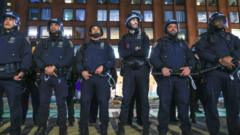While expressing gratitude for the support of Israel's Western allies, Israeli Prime Minister Benjamin Netanyahu emphasized that Israel will make its own decisions regarding their response to Iran's missiles and drone attack.
Following Wednesday's cabinet meeting and having met with British and German foreign ministers who urged for restraint in Israel's response, Netanyahu said, "I thank our friends for their support for Israel's defense, and I say this both in words and in deeds. They also have various proposals and advice, which I appreciate, but I want to clarify that we will make our own decisions. The State of Israel will do whatever is necessary to defend itself...”
Amidst escalating tensions between Iran and Israel, British Foreign Secretary David Cameron and German Foreign Minister Annalena Baerbock flew to Jerusalem earlier in the day. They expressed solidarity with Israel following Iran’s attack and discussed the war in Gaza, including the humanitarian aid situation. The current Middle East conflict began on October 7, when Iran-backed Hamas invaded Israel, killing more than 1,400 mostly civilians and taking about 240 hostages back to Gaza.
Speaking to reporters after the meeting with Netanyahu, Cameron said, “It's clear the Israelis are making a decision to act," further emphasizing the importance of minimizing escalation and ensuring a “smart” approach. Moreover, Cameron stated that during his meeting with Netanyahu he told the Israeli PM that “today, we must maintain our focus on getting more aid into Gaza and getting hostages out."
Echoing Cameron’s comments, Baerbock reiterated Germany's solidarity with Israel while she cautioned against escalation. She stated that “everyone must now act prudently and responsibly”, further adding:
“A spiraling escalation would serve no one, not Israel’s security, not the many dozens of hostages still in the hands of Hamas, not the suffering population of Gaza, not the many people in Iran who are themselves suffering under the regime, and not the third countries in the region who simply want to live in peace.”
Earlier in the day, Iranian President Ebrahim Raisi threatened that even the slightest incursion into Iran would trigger severe retaliation. Speaking at Iran’s annual army day, which was ambiguous relocated to a barracks without any explanation from the authorities, Raisi said that even the "tiniest invasion" by Israel would be met with a "massive and harsh” response from Iran.
Additionally, G7 foreign ministers met in Italy to discuss targeted sanctions against Tehran. Leaders are anticipated to issue a joint plea urging Israel to demonstrate restraint in their response to Iran. France, Germany, Italy, the UK, the United States, Canada and Japan make up the G7 countries.
According to news agency AFP, Italian Foreign Minister Antonio Tajani, who is hosting the talks, confirmed that the ministers were "working" on implementing some form of sanctions against Iran.
Meanwhile, the US, Israel's main ally, has pledged to impose further sanctions.
As world leaders strive for de-escalation and advocate for Israel's measured response, amidst new threats from the Iranian president today, the prospect of a conflict between Iran and Israel remains uncertain.

 1 week ago
22
1 week ago
22

